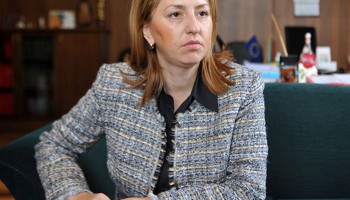In November 2015, Bivol began publishing leaked recordings that appear to feature Vladimira Yaneva, the former President of the Sofia City Court (SCC), and her former deputy and ex-SCC judge, Rumyana Chenalova.
The conversations were taped a year ago, when the Supreme Judicial Council (SJC) had suspended Yaneva for illegally granting permits to use electronic equipment to spy on people. The SJC represents the judiciary, and monitors judicial staffing policy and impartiality.
The wiretaps have once again raised questions about the judiciary’s practices, lack of separation of powers, and questionable adherence to rule of law.
Assen Yordanov, Bivol’s owner and director, and editor-in-chief Atanas Tchobanov gave prosecutor Dimitar Petrov an analysis of the recordings by the Irish lab Acustek which concluded the recordings had not been altered or edited.
“Analysis of continuity and simultaneity of audio acts and events, background acoustics did not reveal any editing or manipulation features… the file copy can be used to establish authenticity of recorded audio, that was originally created at the scene,” is the lab’s conclusion.
The journalists commissioned analysis of only the longest file, which contains some of the most scandalous revelations, implicating people such as the Prime Minister, the Prosecutor General, SJC members, and the President of one of the two Supreme Courts in apparent violations of the law. This file also discusses illegal spying on foreign embassies.
Yordanov and Tchobanov explained in media interviews they told the prosecutor they could not say how the recordings were obtained or by whom, as they arrived through Balkanleaks, Bivol’s platform for anonymous sharing of documents, which is modeled on Wikileaks.
According to the journalists, the Acustek report is now included in the pre-trial proceeding in the case.
In mid-January, the SJC closed its probe into the scandal based on the findings of another expert report.
That report, commissioned by the Prosecutor’s Office, concluded that the recordings were made illegally and were manipulated. However, its author and content have not been released.
Bivol’s journalists said that Acustek has done analyses for the Ministry of Justice of Ireland; the Ministries of Defense and of Interior of France; and the police in Italy, Romania, Poland, Serbia, Morocco, Egypt, China and Latvia.
Dr. Catalin Grigoras, Director of the National Center for Media Forensics in Denver in the US state of Colorado, and specialists from the Media Distribution and Security Department of the Fraunhofer Institute in Germany, have also confirmed for Bivol that the file has not been manipulated.
Little is known about the prosecution’s probe in the case, other than the fact that Chenalova, Yaneva’s deputy, was questioned in addition to Yordanov and Tchobanov.
Prosecutor General Sotir Tsatsarov says the leaked recordings and their publication by Bivol are an attempt to discredit him and his institution.
The prosecution won’t say whether investigators have requested records from Tsatsarov’s office phone or from Viber, as the recordings indicate that both were used. Yordanov and Tchobanov say such records s are readily available and can serve as solid proof.
Yaneva Gate was criticized sharply in the January European Commission report on Bulgaria’s progress that is prepared under the Cooperation and Verification Mechanism (CVM).
“It will be important for the credibility of the process that all steps are taken to ensure that investigation takes place in a transparent and impartial manner,” says the report.






